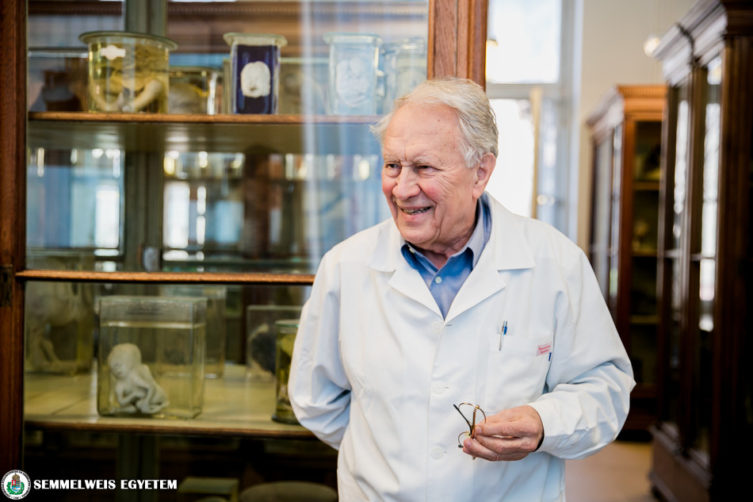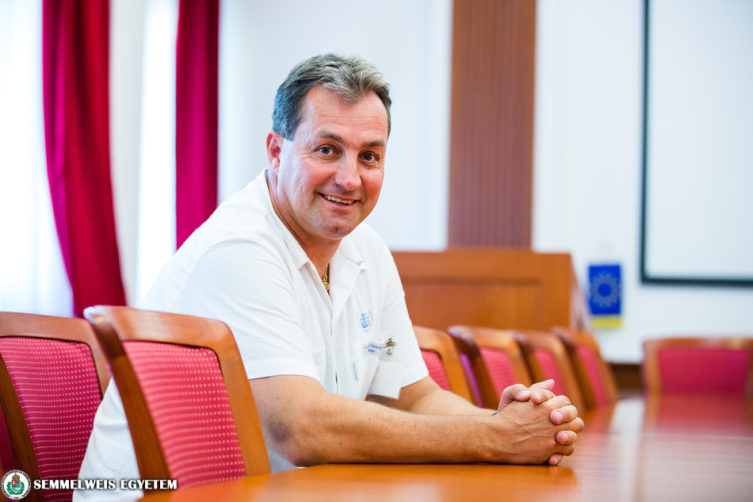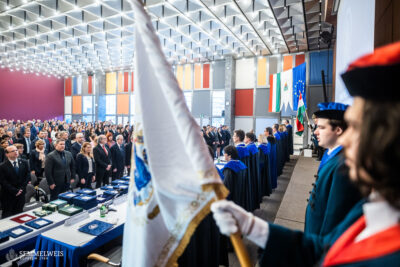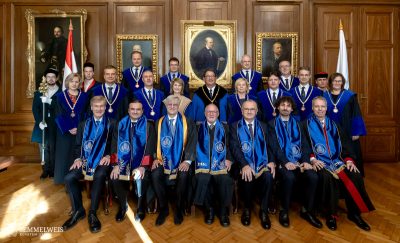Two members of Semmelweis University received an award during the General Assembly of the Hungarian Academy of Sciences (MTA) on Monday. This year’s MTA’s Gold Medal has been awarded to Miklós Palkovits, professor emeritus of the Department of Anatomy, Histology and Embriology, head of the Human Brain Tissue Bank. Dr. Csaba Polgár (head of the Department of Oncology) has also been honored with an award of the Hungarian Academy of Sciences.
The list of the award winners was made public during the 194th General Assembly of the Hungarian Academy of Sciences. Two Semmelweis University citizens were featured on the list.
 The Gold Medal of the Hungarian Academy of Sciences this year was granted to Dr. Miklós Palkovits, professor emeritus of the Department of Anatomy, Histology and Embriology, head of the Human Brain Tissue Bank, full member of the Hungarian Academy of Sciences.
The Gold Medal of the Hungarian Academy of Sciences this year was granted to Dr. Miklós Palkovits, professor emeritus of the Department of Anatomy, Histology and Embriology, head of the Human Brain Tissue Bank, full member of the Hungarian Academy of Sciences.
Dr. Palkovits received the award in recognition for his significant contributions to the field of neuroanatomy, his outstanding scientific work as an internationally recognized neuroscientist, and his brain tissue extraction technique, which had a major impact on modern Hungarian and international neuroanatomical and neuroendocrinological scientific results. He set up the Human Brain Tissue Bank, which has greatly contributed to the development of the modern molecular brain research.
The topic of my research is locating particular brain activities, and finding pathways and networks that are affected by these. This covers a lot of different areas, I have been working on this for almost 70 years. I will turn 88 soon, but I am still working actively and it makes me feel young, no matter many years have passed since.
– said dr. Palkovits in the video published on the official site of the Hungarian Academy of Sciences.
His curriculum is available on the official site of MTA: Miklós Palkovits obtained a medical degree from Semmelweis University in 1958. He worked as a teaching assistant (1958), assistant professor (1965), associate professor (1972) and became university professor in 1980. Between 1972 and 2006 he spent six months every year working in the National Institute of Mental Health with Nobel Prize winner Julius Axelrod. He was visiting professor in the Netherlands, the USA, Venezuela, Italy and Slovakia. He became corresponding member of the Hungarian Academy of Sciences and was elected a full member in 1995. His areas of specialty are neuroanatomy, neuroendocrinology and brain regulation mechanisms. The “Palkovits punch-technique” (which allows extraction of minute amounts of brain tissue from exact locations in the brain) was named after him. He is the founder of the Human Brain Tissue Bank of the Department of Anatomy, Histology and Embriology, which currently serves as a storage for more then seventy thousand brain samples. He founded the first Hungarian graduate school along with Gábor Makara. He is one of the most cited living Hungarian researchers, he was three times nominated for the Nobel Prize. His professional work has been recognized with various distinctions: Széchenyi Prize, Hungarian Heritage Award and the German Rienecker award.
The Hungarian Academy of Sciences awards only one gold medal each year for the recognition of outstanding academic, public and scientific activities. Dr. Miklós Palkovits was presented the award online, during the formal sitting of the 194th General Assembly of the Hungarian Academy of Sciences on 3rd May.
 In recognition of his outstanding scientific work, dr. Csaba Polgár (head of the Department of Oncology at the National Institute of Oncology, chief physician of the Center for Radiation Therapy, member of the Hungarian Academy of Sciences) was presented with the Academic Award. He received the award in recognition for his internationally recognized research activities in radiotherapy, the introduction of modern radiotherapy procedures in clinical practice and his outstanding academic activities.
In recognition of his outstanding scientific work, dr. Csaba Polgár (head of the Department of Oncology at the National Institute of Oncology, chief physician of the Center for Radiation Therapy, member of the Hungarian Academy of Sciences) was presented with the Academic Award. He received the award in recognition for his internationally recognized research activities in radiotherapy, the introduction of modern radiotherapy procedures in clinical practice and his outstanding academic activities.
The list of award winners is available here.
Ádám Szabó
source: Hungarian Academy of Sciences
Translation: Norbert Lukács


